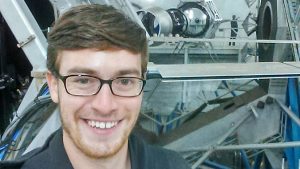Four current and former doctoral students from the University of Hawaiʻi at Mānoa Institute for Astronomy (IfA) have been recognized for outstanding research.

Megan Ansdell, who completed her doctoral dissertation in 2017, was awarded the International Astronomical Union’s (IAU) prize for the best PhD thesis in planetary science. Her thesis, “Protoplanetary Disk Demographics with ALMA,” was selected from more than 20 nominations from around the world. As part of her award, Ansdell will deliver a presentation on her thesis as an invited speaker at August’s IAU General Assembly in Vienna, Austria.

First-year graduate student Michael Tucker was awarded the Department of Energy’s Computational Science Graduate Fellowship, which supports doctoral students in fields that use high-performance computing to solve complex science and engineering problems. Tucker’s research is motivated by the accelerating pace of discovery of astronomical transients such as supernovae, thanks to UH-related all-sky surveys. Just spotting a new object does not tell astronomers what that variable or explosive objects is, so Tucker will combine machine-learning algorithms with additional observations from the recently renovated UH 88” telescope on Maunakea to reveal what these objects are in practically real-time. The fellowship provides four years of funding, with a $36,000 annual stipend and a $5,000 research budget. Tucker is the first student at UH to be awarded this fellowship since its inception in 1991.

Second-year doctoral student Ashley Chontos received a National Science Foundation Graduate Research Fellowship. She is researching oscillations in stars with the recently launched Transiting Exoplanet Survey Satellite to better understand the planets that orbit them. Stellar oscillations provide information about their sizes and interiors. In the special case that planets are found around these oscillating stars, characteristics can be determined about the interior structure of the planet, an important piece of information for planet habitability. These fellowships support outstanding graduate students in NSF-supported science, technology, engineering and mathematics disciplines. They are very competitive, with only one in six applicants awarded.

Fifth-year PhD student Sam Grunblatt was honored with UH Mānoa’s Student Excellence in Research Award, by the Office of the Vice Chancellor for Research. Grunblatt studies exoplanets (planets outside our solar system) orbiting distant red giant stars, which are future versions of the Sun. Combining data from the NASA K2 Mission, world-class telescopes on Maunakea and novel analysis techniques, Grunblatt has discovered two new planets orbiting such stars, shedding light on the mechanism responsible for the formation of these exotic systems.
IfA has produced over 200 astronomy PhDs since the first class graduated in 1975. Eighty-five percent of PhD recipients have gone on to careers in astronomy, with many winning major awards and in leadership positions at astronomical observatories and institutes.
—By Roy Gal

